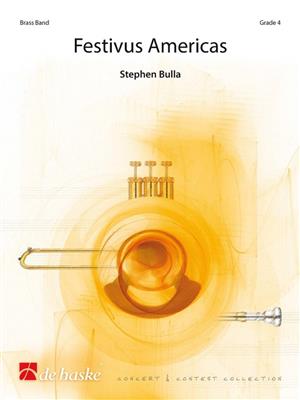Results
-
 £59.99
£59.99Perfect
Pop singer Ed Sheeran continues to dominate the charts, and this romantic ballad from his third album reached No. 1 in sixteen different countries! Here is a sensitive version for band with flowing melodies and nicely varied orchestration.
Estimated dispatch 5-14 working days
-
 £105.20
£105.20Stjernesangen fra Finlandia - Jean Sibelius
The Finnish composer Jean Sibelius (1865-1957) is widely recognized as his country's greatest composer, and through his music he helped Finland to develop a national identity during its struggle for independence from the Russian empire. The tone poem Finlandia (1899-1900) played an important role in this part of Finnish history, and the hymn has become an important song to the Finnish people.
Estimated dispatch 5-14 working days
-
 £74.99
£74.99Dreamsong - Philip Sparke
Dreamsong was commissioned by Geir Ulseth and the Nidaros Brass Band from Trondheim, Norway. After a short introduction, the soloist introduces a rather nostalgic melody, accompanied by the lower brass parts. A fast central section is then played by the band, which leads to a climax. Eventually, the main melody played by the solo Cornet and Flugel Horn returns, overlaid with an ornamented counter-melody from the soloist, who then closes the piece with a short cadenza.
Estimated dispatch 5-14 working days
-
 £84.99
£84.99Festivus Americas - Stephen Bulla
Dedicated to the North American Brass Band Association, this is music that is full of energy and dynamic extremes. In form it draws from the overture style, although the themes are self-existing and the piece is programmatic. Working well asa festival opener, it sets a mood of excitement. Following the rhythmic fanfares of the opening, the first theme is presented in the cornets followed by a return to the same rhythmic material. A second theme appears in the horn section and isdeveloped, changing into a darker and sinister form of the same motif. Eventually a Maestoso section is reached, full of sustained block chords in the cornets and trombones, as the rest of the band counters with cascading lines that weavestraight through the brighter instruments.
Estimated dispatch 5-14 working days
-
 £74.99
£74.99The Mermaid of Zennor - Philip Harper
Commissioned by the Cornwall Youth Brass Band to mark its 60th Anniversary, with funds bequethed by Dennis Arbon This piece is inspired by an old Cornish folk-tale set in the village of Zennor on the coast of Cornwall, the most South-Westerly countyof England.The music is in three sections:l. The Sea and Seafaringll. At the Churchill. Return to the Waves
Estimated dispatch 5-14 working days
-
 £105.20
£105.20Themes from the movie 3 hazelnuts for Cinderella - Karel Svoboda
Three Hazerlnuts for Cinderella, original title Drei Haselnusse fur Aschenbrodel, is an East German-Czechoslovakian adventure film from 1973.The film has been shown on Norwegian Broadcasting Corporatin TV every Christmas Eve since 1975. ThreeHazelnuts for Cinderella is also broadcasted as a Christmas film on TV in several other European countries.The film has both Czech and East German actors, and is available both in a German and a Czech edition.
Estimated dispatch 5-14 working days
-
 £102.99
£102.99Golden Eagle - Hermann Pallhuber
The eagle has always held a high symbolic value. It stands for freedom, dignity and pride in one's own country. In Hermann Pallhuber's Golden Eagle, the music describes the flight of the eagle along the Tyrolean Mountains, gazing down from on high at the breathtaking landscape below. Let your imagination run free and come fly with us!
Estimated dispatch 5-14 working days
-
 £92.00
£92.00 -
 £17.99
£17.99The Foggy Dew - Philip Doe
'The Foggy Dew' is one of those charming Irish melodies which seem to capture the beauty and serenity of that country, all of which is evoked in this delicate arrangement by Philip Doe.
Estimated dispatch 5-14 working days
-
 £19.95
£19.95Bandkraft 1
The first of three superb sets of new music and arrangements for brass ensemble, edited by John Golland.1. Bandkraft - John Golland: A substantial piece with an exciting syncopated rhythm introduced in the opening bars and referred to throughout in a fanfare-like manner, to which a hint of dissonance adds extra thrill to the sound.2. Saraband - Gordon Jacob: A stately Elizabethan dance of great beauty, utilising modal harmony in Jacob's characteristic style. Constant speed, full note values and careful playing will achieve a beautiful, delicate effect.3. La Donna E Mobile - Verdi, arr. Roy Newsome: An amusing arrangement of this popular favourite by a conductor and adjudicator of international acclaim. Easy and enjoyable to play and to listen to.4. Spike's Rag - Michael Ball: A skilfully written piece in the true tradition of Scott Joplin, with the ragtime rhythm the backdrop to an unfolding conversation between the sections of the band. Really persuasive entertainment.5. National Anthem - arr. John Golland: A simple first verse setting the scene for the colourful and majestic second, utilising chromatic harmonies and an optional tenor counter melody for added splendour.
Estimated dispatch 5-14 working days
